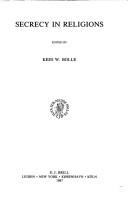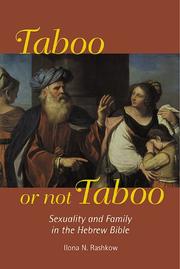| Listing 1 - 5 of 5 |
Sort by
|

ISSN: 01698834 ISBN: 9004083421 9004378685 9789004083424 Year: 1987 Volume: 49 Publisher: Leiden Brill
Abstract | Keywords | Export | Availability | Bookmark
 Loading...
Loading...Choose an application
- Reference Manager
- EndNote
- RefWorks (Direct export to RefWorks)
Secrecy --- Secret --- Religious aspects --- Comparative studies --- Aspect religieux --- Etudes comparatives --- 291.211.8 --- -Concealment --- Privacy --- Hiding places --- Taboe --- -Comparative studies --- -Taboe --- 291.211.8 Taboe --- -291.211.8 Taboe --- Concealment --- Religious aspects&delete& --- Geheim / in de godsdienst. (Versch. onderwerpen) --- Godsdiensten. (Versch. onderwerpen) --- Mystère. (Mélanges) --- Secret / dans la religion. (Mélanges) --- Religions. (Mélanges) --- Mysterie. (Versch. onderwerpen) --- Religious education --- Religious education (Theology) --- Comparative studies. --- Philosophy.
Book
ISBN: 9782247084159 Year: 2010 Publisher: Paris : Dalloz,
Abstract | Keywords | Export | Availability | Bookmark
 Loading...
Loading...Choose an application
- Reference Manager
- EndNote
- RefWorks (Direct export to RefWorks)
Religious law and legislation --- Droit religieux --- 291.211.8 --- 39 --- 291.5 --- Taboe --- Volkenkunde. Zeden en gebruiken. Culturele antropologie --- Godsdienstwetenschap: moraal; religieuze wet; zedelijk ideaal; religieuze plichten --- 291.5 Godsdienstwetenschap: moraal; religieuze wet; zedelijk ideaal; religieuze plichten --- 39 Volkenkunde. Zeden en gebruiken. Culturele antropologie --- 291.211.8 Taboe --- Tabou --- Aspect religieux --- Dictionnaires --- interdits religieux --- loi religieuse --- linguistique
Book
ISBN: 9780190942458 0190942452 0190942487 0190942460 Year: 2019 Publisher: New York, NY Oxford University Press
Abstract | Keywords | Export | Availability | Bookmark
 Loading...
Loading...Choose an application
- Reference Manager
- EndNote
- RefWorks (Direct export to RefWorks)
What cannot be said about God, and how can we speak about God by negating what we say? Travelling across prominent negators, denialists, ineffectualists, paradoxographers, naysayers, ignorance-pretenders, unknowers, I-don't-knowers, and taciturns, Unsaying God: Negative Theology in Medieval Islam delves into the negative theological movements that flourished in the first seven centuries of Islam. Kars agrues that there were multiple and often competing strategies for self-negating speech in the vast field of theology. By focusing on Arabic and Persian textual sources, the book defines four distinct yet interconnected paths of negative speech formation on the nature of God that circulated in medieval the Islamic world. Expanding its scope to Jewish intellectuals, Unsaying God also demonstrates that religious boundaries were easily transgressed as scholars from diverse sectarian or religious backgrounds could adopt similar paths of negative speech on God. This is the first book-length study of negative theology in Islam. As an introductory work, it aims to encompass vast fields of scholarship, and diverse intellectual schools and figures. Throughout, Kars demonstrates how seemingly different genres should be read in a more connected way in light of the cultural and intellectual history of Islam instead of considering them as different opposing sets of orthodoxies and heterodoxies.
God (Islam) --- Negative theology --- Islamic countries --- Proof --- History of doctrines --- Islam --- Intellectual life --- Allah --- Monotheism (Islam) --- Proof&delete& --- Muslim countries --- Intellectual life. --- 291.211.8 --- 291.211.8 Taboe --- Taboe --- God (Islam) - Proof - History of doctrines --- Negative theology - Islam --- Islamic countries - Intellectual life

ISBN: 0800630858 9780800630850 Year: 2000 Publisher: Minneapolis (Minn.): Fortress
Abstract | Keywords | Export | Availability | Bookmark
 Loading...
Loading...Choose an application
- Reference Manager
- EndNote
- RefWorks (Direct export to RefWorks)
This volume explores the positive and negative aspects of family life in ancient Israel as portrayed in the Bible. Rashkow examines the relationships between husbands and wives, parents and children, and siblings, looking at the variety of conflicts that emerged: incest, rape, abuse, murder, and hatred. Ultimately, Rashkows analysis provides a reflection on family, which is given texture and depth through her use of psychoanalysis and literary theory. This text traces the influence of the biblical images on later Western literature and society and provides comparative discussions of other ancient Near Eastern literatures. [publisher's description]
Problem families in the Bible. --- Sex in the Bible. --- Psychoanalysis and religion. --- Bible. --- Psychology. --- 221.08*2 --- 291.211.8 --- Problem families in the Bible --- Sex in the Bible --- Psychoanalysis and religion --- Religion and psychoanalysis --- Religion --- Theologie van het Oude Testament: moraal; ethica; juridica Israelis; vroomheid --- Taboe --- 291.211.8 Taboe --- 221.08*2 Theologie van het Oude Testament: moraal; ethica; juridica Israelis; vroomheid --- Dysfunctional families in the Bible --- Antico Testamento --- Hebrew Bible --- Hebrew Scriptures --- Kitve-ḳodesh --- Miḳra --- Old Testament --- Palaia Diathēkē --- Pentateuch, Prophets, and Hagiographa --- Sean-Tiomna --- Stary Testament --- Tanakh --- Tawrāt --- Torah, Neviʼim, Ketuvim --- Torah, Neviʼim u-Khetuvim --- Velho Testamento
Book
ISBN: 9783727817717 9783525543986 3727817712 3525543980 Year: 2015 Volume: 274 Publisher: Fribourg Göttingen, Germany Academic Press ; Vandenhoeck & Ruprecht
Abstract | Keywords | Export | Availability | Bookmark
 Loading...
Loading...Choose an application
- Reference Manager
- EndNote
- RefWorks (Direct export to RefWorks)
Ces contributions analysent la nécessité pour une société de se doter de tabous (alimentaires, sexuels, religieux, etc.) qui, inévitablement, sont accompagnés de transgressions. La problématique est centrée sur l'univers biblique (Mésopotamie, Israël ancien, Egypte ancienne) avec deux articles consacrés à la Grèce ancienne et au monde arabe médiéval. ©Electre 2016
Taboo --- Civilization, Assyro-Babylonian --- Tabou --- Civilisation assyro-babylonienne --- History --- Congresses --- Biblical teaching --- Histoire --- Congrès --- Enseignement biblique --- Congrès --- Taboo in literature --- Purity, Ritual --- Religion --- Sacrilege --- Bible. --- Antico Testamento --- Hebrew Bible --- Hebrew Scriptures --- Kitve-ḳodesh --- Miḳra --- Old Testament --- Palaia Diathēkē --- Pentateuch, Prophets, and Hagiographa --- Sean-Tiomna --- Stary Testament --- Tanakh --- Tawrāt --- Torah, Neviʼim, Ketuvim --- Torah, Neviʼim u-Khetuvim --- Velho Testamento --- Study and teaching --- 291.211.8 --- 22 <063> --- 22 <063> Bijbel--Congressen --- 22 <063> La Bible. Ecriture sainte. Livres sacres--Congressen --- Bijbel--Congressen --- La Bible. Ecriture sainte. Livres sacres--Congressen --- 291.211.8 Taboe --- Taboe --- 11.40 Old Testament: general. --- Education. --- Old Testament. --- Taboo in literature. --- Taboos. --- Biblical teaching. --- Bible --- Study and teaching.
| Listing 1 - 5 of 5 |
Sort by
|

 Search
Search Feedback
Feedback About UniCat
About UniCat  Help
Help News
News